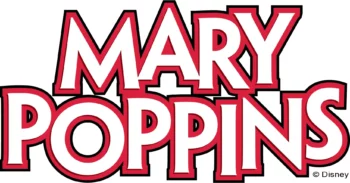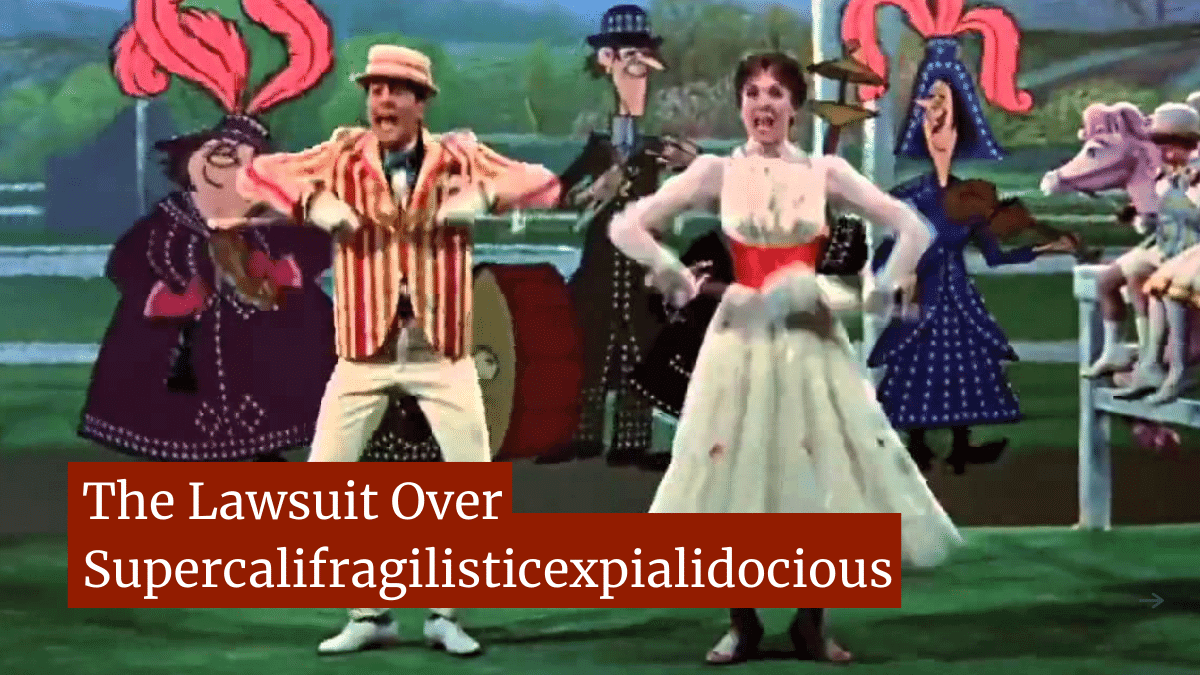The Bizarre Copyright Battle Over Supercalifragilisticexpialidocious

For most people, the word Supercalifragilisticexpialidocious has exactly one context, the 1964 film Mary Poppins and the famous hybrid live action/animated scene that it was featured in.
The word and the song that it titles has remained a part of our lexicon for nearly sixty years and, despite being a famous tongue-twister (so much so, it was featured in a recent Mental Floss episode on the topic), has been on the tongues of generations.
However, in 1965, there was a very different conversation about the song. Life Music Inc, representing songwriters Gloria Parker and Barney Young, filed a lawsuit against Disney and others involved in the film alleging that the Disney version of Supercalifragilisticexpialidocious violated the copyright of their 1951 song Supercalafajalistickespeealadojus.
According to the original claim, Young had invented the word in 1921, though he did not compose their version of the song until 1949.
They further claimed that the Disney songwriters, Richard and Robert Sherman, gained access to their version of the song either from a club where Parker used to perform at, including their version of the song, or via a copy they sent to Disney. They went on to claim that the Disney version was based on their work, infringing their copyright.
However, the case didn’t make it very far. The plaintiffs in the case asked for an injunction, but were denied one by the district court judge. According to the judge, the plaintiffs were unlikely to succeed on their claims for two main reasons.
First, even though the songs had similar names and were upbeat tunes, musically they had nothing in common other than having the same starting and ending notes, keys and tempo. According to the judge, and an expert witness who filed a report for the defendants, these are similarities shared by many songs.
Second, even though short phrases can be copyright protected under certain circumstances, the court found that there were many instances of the word Supercalifragilisticexpialidocious or similar variations being used well before the plaintiff’s version of the song was written.
This included a 1931 mention of a similar word in the Syracuse Daily Orange, as student journalist Helen Herman claimed to have coined the word “Supercaliflawjalisticexpialadoshus.”
In short, the court found that it was known to the public before the plaintiff’s version was released and was already a common “nonsense phrase.”
With the injunction defeated, the lawsuit seems to have died out. However, that is hardly a surprise as the judge, when denying the injunction, made it extremely clear that their chances of success were extremely low.
In the end, the case is more of a footnote in both the film’s history and the history of copyright. However, it’s an important case to keep in mind, especially litigation over music seems to be on the rise.
Why It’s Worth Remembering
Though the novelty of the case is clear, there’s also a serious reason to look back at this case.
In 2022, we seem to be in a time when litigation over music is ever-present. Whether it’s Mariah Carey being sued over All I Want for Christmas is You, Dua Lipa being sued twice over her song Levitating or Disney once again finding itself in the defendant’s chair over a Frozen 2 song, these lawsuits seem to be coming at least weekly.
Tons of reasons are cited for this rise. Would-be plaintiffs feeling emboldened after the Blurred Lines verdict in 2015 and new technology that makes detecting both samples and similarities easier have been pointed at and likely have contributed.
However, it’s important to remember that these kinds of cases have always been with us. For as long as there has been a recorded music industry, there have been lawsuits where lesser-known creators have claimed infringement and, in the vast majority of those cases, were unsuccessful.
While there are high-profile cases where the plaintiff won, in general, those deal with battles between two relatively well-known musicians, such as Chuck Berry’s victory over John Lennon or The Rolling Stones lawsuit against The Verve.
Part of that is because the issue of access is much easier to prove with already-famous performers, but it’s also where actual copying, either accidental or intentional, is more likely to take place.
Though the narrative of the small artist being ripped off by the big corporation or the big musical act is a compelling one, it rarely pans out to be true.
Bottom Line
Obviously, this story is an amusing one. That especially true given the thought of me repeatedly typing (or more realistically pasting) Supercalifragilisticexpialidocious into this article.
But, as unimportant as the case may seem to be both legally and culturally, it’s still a good one to keep in mind. If Supercalifragilisticexpialidocious can face a copyright infringement lawsuit, almost any song can.
This isn’t to imply that the plaintiffs were acting in bad faith. As with most such cases, their belief that they were copied is, most likely, completely genuine.
As we’ve seen before, it’s easy, when looking only at the similarities, to see plagiarism and/or copyright infringement where there is none.
Still, the next time you hear about a musician being sued for copyright infringement, just remember that this is nothing new and, for better or worse, is part of a long tradition that goes back decades, if not for over a century.
Want to Reuse or Republish this Content?
If you want to feature this article in your site, classroom or elsewhere, just let us know! We usually grant permission within 24 hours.
